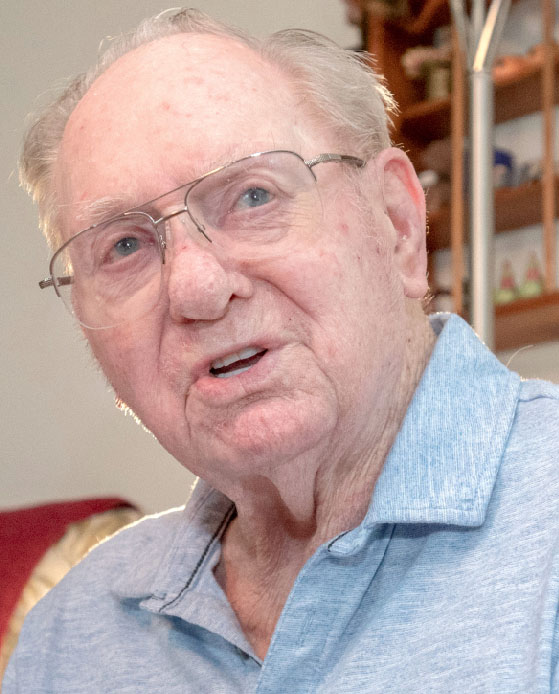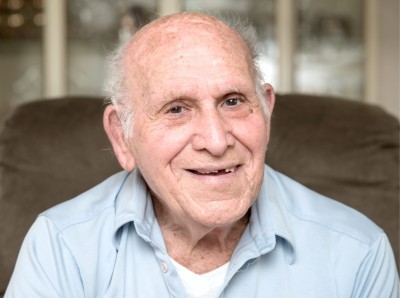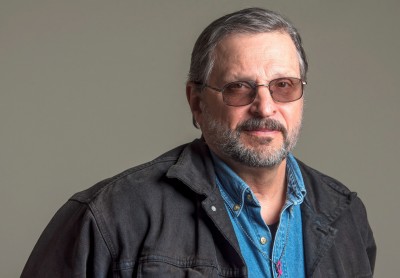Gene Richards
By Paul Wood

Photo By Stephen Haas/The News-Gazette
Major Gene Richards “walked through the rain, but didn’t get wet” in Afghanistan.
The rain includes small arms fire, mortar fire, IEDs and even a helicopter crashing into his plywood and sandbag compound, Combat Outpost Fiaz.
Richards, 47, is now an assistant professor of military science at the University of Illinois.
The Shelbyville, Ind., native enlisted out of high school but later earned two college degrees, and has also taught at Clemson and Purdue.
Richards served almost everywhere and in almost every capacity.
In a 26-year career, he served in Germany, Africa, Korea and Honduras, among other places.
“I’ve been to every continent except Antarctica,” says Richards, who enlisted in 1989 right out of high school.
He spent over six years in military intelligence, “where there was a lot of fulfilment.”
“The Berlin Wall came down at that time,” he said.
Richards earned the rank of staff sergeant but, before actually pinning on that rank, accepted a Green-to-Gold scholarship and attended Indiana University, receiving his degree in East Asian Studies.
As an aviation branch officer and Blackhawk helicopter pilot in 2004, he served as company commander in the only forward-deployed Theater Aviation Battalion in Honduras.
“The primary missions of Joint Task Force-Bravo were to provide humanitarian assistance/disaster response and counter-narcotics operations,” Richards said.
Richards shuttled back and forth from assignments in Korea throughout his career.
As a captain, he was assigned as an assistant professor at Clemson University and was named the National Defense Industrial Association’s Army ROTC Instructor of the Year for 2006.
Promoted to major in 2007, he then returned to Korea for yet another tour there, and first served as the Deputy Chief of Eighth Army’s G-3 Aviation Division.
Richards then served as battalion executive officer for the U.S. Army’s Korean Service Corps Battalion, with 2,185 Korean National paramilitary personnel.
“In my opinion, the Army’s objective in Korea during that time was all about maintaining the status quo,” he said.
In March 2011, it was time for Afghanistan and Operation Enduring Freedom.
There he was part of a Security Force Advisory Team training Afghan National Security Forces.
The International Security Assistance Force is led by U.S. forces helping the Afghan government to develop the area while training Afghan security forces to provide their own security, including the Afghan National Police, the Afghan Border Police and the Afghan National Army.
Asadabad is the capital city of Kunar Province, where the Pech River and Kunar River converge, a hotly contested area then.
Though he always took orders readily, “I wouldn’t want to go back” to Afghanistan, Richards said.
“I could not assimilate with the Afghans; the country was one step out of the Stone Age,” Richards said.
Mortar fire and IEDs were regular parts of his life. A road up the Pech River was known for its IEDs.
Twenty soldiers died from his unit during his deployment with the 3rd Brigade Combat Team of the 25th Infantry Division out of Schofield Barracks, Hawaii, though none from his small seven-man team.
And then there was the helicopter crash.
“I heard an explosion, but not like a mortar round.” Richards said. “I thought it was a suspected suicide bomber reported about earlier that morning.”
His command post covered in a cloud of dust, he and his team were the first to respond to the scene. The international crew of the Afghan Air Force Mi-17 helicopter, including a U.S. Air Force colonel, were “all banged up and bloodied but, fortunately no one had been killed.”
The constant sound of explosions?
“You get kind of used to it,” he said.
But not all do.
He knows PTSD is common among Afghanistan and Iraq veterans.
Richards wears a wristband with “22” on it — every day, 22 veterans take their lives.
So, besides teaching ROTC classes at UIUC, Richards has started a company called Modern Freedom Lifestyle in West Lafayette, Ind., intended to help veterans by offering them jobs and business ownership opportunities.
Do you know a veteran who could share a story about military service? Contact Paul Wood at pwood@news-gazette.com.
Read more stories from local veterans:
 Cleo Grovier
RANTOUL — Fireman First Class Cleo Grovier was on a landing craft headed to invade Japan when he learned two atom bombs …
Cleo Grovier
RANTOUL — Fireman First Class Cleo Grovier was on a landing craft headed to invade Japan when he learned two atom bombs …
 Michael Palmisano
CHAMPAIGN — In a Philippine Islands jungle in World War II, Japanese snipers picked off American soldiers from the trees …
Michael Palmisano
CHAMPAIGN — In a Philippine Islands jungle in World War II, Japanese snipers picked off American soldiers from the trees …
 Ray Wolst
RANTOUL — Vietnam era veteran Ray Wolst is on Tuesday’s honor flight. “I’m pretty proud of that, and I’ve never been to …
Ray Wolst
RANTOUL — Vietnam era veteran Ray Wolst is on Tuesday’s honor flight. “I’m pretty proud of that, and I’ve never been to …